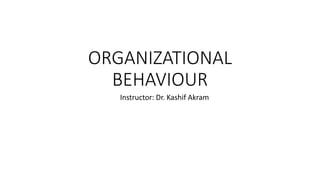
1.ORGANIZATIONAL BEHAVIOUR.pptx
- 2. Key Concepts of Management Managers Management Functions of Management Levels of Management Skills of Management Roles of Managers
- 3. Effective versus Successful Managerial Activities TRADITIONAL MANAGEMENT: DECISION MAKING, PLANNING, AND CONTROLLING. COMMUNICATION: EXCHANGING ROUTINE INFORMATION AND PROCESSING PAPERWORK. HUMAN RESOURCE MANAGEMENT: MOTIVATING, DISCIPLINING, MANAGING CONFLICT, STAFFING, AND TRAINING. NETWORKING: SOCIALIZING, POLITICKING, AND INTERACTING WITH OUTSIDERS.
- 5. Enter in Organizational Behaviour (OB) • What is OB? Organizational behavior (often abbreviated OB) is a field of study that investigates the impact that individuals, groups, and structure have on behavior within organizations, for the purpose of applying such knowledge toward improving an organization’s effectiveness • Intuition VS Systematic Study • Evidence based Management
- 6. • Psychology : Psychology seeks to measure, explain, and sometimes change the behavior of humans and other animals. Those who have contributed and continue to add to the knowledge of OB are learning theorists, personality theorists, counseling psychologists, and, most important, industrial and organizational psychologists. • Social Psychology: Social psychology, generally considered a branch of psychology, blends concepts from both psychology and sociology to focus on peoples’ influence on one another. One major study area is change—how to implement it and how to reduce barriers to its acceptance. Social psychologists also contribute to measuring, understanding, and changing attitudes; identifying communication patterns; and building trust. Finally, they have made important contributions to our study of group behavior, power, and conflict
- 7. • Sociology: While psychology focuses on the individual, sociology studies people in relation to their social environment or culture. Sociologists have contributed to OB through their study of group behavior in organizations, particularly formal and complex organizations. Perhaps most important, sociologists have studied organizational culture, formal organization theory and structure, organizational technology, communications, power, and conflict. • Anthropology: Anthropology is the study of societies to learn about human beings and their activities. Anthropologists’ work on cultures and environments has helped us understand differences in fundamental values, attitudes, and behavior between people in different countries and within different organizations
- 9. Challenges and Opportunities for OB • Responding to Economic Pressures • Responding to Globalization • Managing Workforce Diversity • Improving People Skills • Stimulating Innovation and Change • Working in Networked Organizations • Helping Employees Balance Work–Life Conflicts • Improving Ethical Behavior